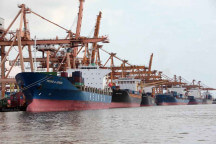DHAKA: For the safety of workers and need of better environment, the Bangladesh apparel sector needs around $3 billion to relocate factories from the capital, a leading economist said yesterday.
“The fund is manageable as it is not a big amount,” said Ahsan H Mansur, executive director of Policy Research Institute.
The government should discuss the matter with global lenders, such as the World Bank, Asian Development Bank and Japan International Cooperation Agency to find a finance mechanism with low interest rates to transform the garment industry, he said.
Around 1,000 factories need to be relocated from the capital, according to Bangladesh Garment Manufacturers and Exporters Association. “Relocation will help the sector attain $50 billion in annual exports by 2021,” Mansur said.
He spoke at a session on remediation financing to transform Bangladesh’s garment industry, at Dhaka Apparel Summit organised by BGMEA at Bangabandhu International Conference Centre in the capital.
Suppliers are facing some challenges in getting access to low-cost finances due to the lack of a workable mechanism, he said.
VF Corporation, an American clothing giant, teamed up with IFC to provide $10 million to finance fire and building safety improvements, said Thomas A Nelson, the company’s vice president of global product supply.
This fund is part of VF’s overall $17 million commitment to the health and safety of Bangladeshi garment workers, Nelson added. “We are focusing on the safety of workers who made our products.”
Rob Wayss, executive director of Accord on Fire and Building Safety in Bangladesh, said: “We approached 10 brands and some are in the final stages of approving funds for factory remediation.” Accord is in discussion with retailers to get finance for suppliers for factory remediation, he added.
Muhammad A Rumee Ali, a former deputy governor of BB, said: “We need a standard to make funds available for the garment factories because it is needed not only for the exporters but, more importantly, for the millions of workers in the sector.”
“The industry is not waiting to receive financial solutions for remediation. They are carrying on remediation efforts, which is unique,” said Kyle Kelhofer, IFC country manager for Bangladesh, Nepal and Bhutan.
“The inspection of some factories that were outside the purview of Accord and Alliance are being carried out under the National Action Plan. It is necessary to discuss how they will carry on remediation,” said Sarah Labowitz, co-director of NY University Stern Center for Business and Human Rights.
“I hope that real discussions will take place on the practical solutions to how finance comes to small and medium sized factories.”





